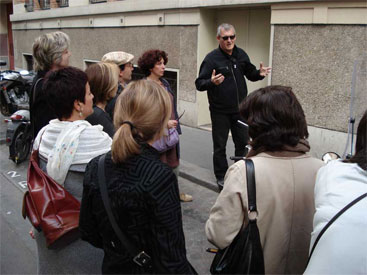

2007-2012
Performance
Year of Purchase: 2006
“Thank you for your company.”1
“The value of cities is determined by the number of places in them which have been left to improvisation.”
Siegried Kracauer, “Stehbars im Süden” in Strassen in Berlin und anderswo (Frankfurt: Suhrkampf Verlag, 1964).
How does a city make its citizens walk? That is a history of directions.2
To capture a city requires an art of seeing which corresponds to the figure of the flâneur, as described by Charles Baudelaire and Walter Benjamin. For some solitary, for others collective, this attitude is developed by Dector-Dupuy into a “minimal dramaturgy”3 as a means of bringing together two realities: the public space and the exhibition space. Following several days of finding their way in a given city, the hour-long, group “performance—guided tour”4 is the culmination of urban collecting of signs, objects, and graffiti. Speaking in turns, Michel Dector and Michel Dupuy, with the aid of literary, artistic, and historical references describe and debate in order to reveal the city’s “disturbances”: a graffiti tag, broken bottles, a row of historical windows… While a guided tour is a PR device, an informational tool meant to help acquire and clarify knowledge, Dector-Dupuy bypass its communicational character and subvert its codified form. Privileging direct observation of situations, they concur that we are being observed by the city. Opening up towards fiction and imagination,5 their guided tours are defined by the principle of exchange and by the subversion of the logic of a tour: they engage the group in a dialog, through which information is being transmitted, not by the authority of knowledge, but in a poetical and emotional form.
Seeking, locating, capturing, sampling, establishing connections… all these actions compose the repertory of well-defined gestures that for twenty years have been the basis of Dector-Dupuy’s socially engaged work. “First, our friendship, the proximity of work, reciprocal critique, then an association, a name… We do all our work together. The responsibility of work is total for both of us.”6 Dector-Dupuy reveal social and political relations of the urban space, superposed realities, and overlapping interpretations. Always on the move, they elaborate a contemporary anthropology of the gaze. “We move things and place them elsewhere. It’s a work of unsettling… It’s not at the same level as political, union, reporting, or terrorist activity. What we hope to do is to materialize an attitude, which ends up transforming our view of the world.”7
It’s by inventing another time in order to gain access to the city and by resisting the turmoil, that Dector-Dupuy destabilize our normative perception. “Creating outside,” making do with urban, collective, and human deficiencies… the guided tour becomes a form of time needed to inscribe the world in a sensory network. This creative wandering dialectically engages8 the real and its experience. It’s through an alliance of language and walking that every tour is being constructed out of fragile elements and changing contexts in order to produce a new memory. Dector-Dupuy conduct an inquiry like detectives and establish a fragmented cartography of the city. By incorporating the ephemeral, the precarious, and chance, they depart from the gaze of the tourist and its frenzied consumption, and subtly integrate contemporary transformations which ask us questions, affect us, and fill us with enthusiasm.
Marianne Derrien
1 The phrase uttered by Dector-Dupuy at the end of each visit.
2 See Rachel Thomas, “La marche en ville. Une histoire de sens.” (The Walk in the City. A History of Directions.), in (1) L’espace Géographique (2007), pp. 15–26.
3 Extract from my interview with Dector-Dupuy, May 31, 2010.
4 The acquisition of this Guided Tour [by FRAC Lorraine] covers the creation–realization of five performances.
5 “Over here twin beer bottles. . . . They’re curious. They elicit fiction, imagination” (extract from the guided tour of Sunday, May 16, 2010).
6 Interview with Anna Olszewska, (74) Petit journal, Le Quartier, Quimper, November 22, 2009 – January 10, 2010.
7 Interview with Jerôme Sans, in Hardcore, Exhibition catalog, 2003.
8 To engage dialectically “in” and “with” the real in order to renew it, as defined by Thierry Davila in Marcher, créer (Walking, creating), Paris: Editions du Regard, 2007, p. 165.